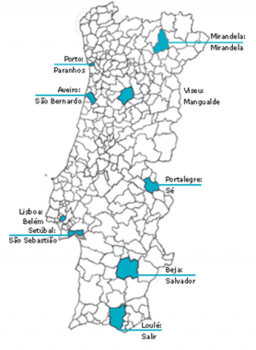

 Public Services
Public Services  Projects
Projects  Electronic Voting
Electronic Voting  2004 European Elections
2004 European Elections 2004 European Elections
- 28/05/2008The experimental piloting which was carried out in Portugal during the election for the European Parliament on 13 June 2004 had the following main aims:
- Quantatively measure the impact of the introduction of new technologies in voting on voters, and thus identify the main factors blocking the future implementation of this project;
- Measure the impact on distinct social realities, through carrying out face-to-face interviews to complete seven thousand (7,000) questionnaires;
- Disseminate the potential of presencial electronic voting amongst citizens, by familiarising them with this type of technology;
- Simulate the complete voting procedure using technological platforms, and compare different technologies in terms of their usability and security.
To achieve these aims, the underlying principle running through the project was one of breaking the current electoral process down into its three stages – Identification, Voting and Counting – using technological platforms.
Three technological solutions were used which were produced by two multinational suppliers – INDRA and UNISYS – and a national consortium – Multicert/PT Inovação. Each of these companies set up the technological infrastructure in a group of three wards which had different social and demographic profiles (one large-scale urban ward, one semi-urban medium-sized ward and one small rural ward).
The project was coordinated by The Knowledge Society Agency (UMIC) and by the Technical Secretariat for Electoral Procedures- STAPE, and was supervised by the Portuguese National Election Commission - CNE and the Portuguese Data Protection Authority - CNPD.
The experimental piloting took place in 9 wards: Mirandela (Mirandela); Paranhos (Oporto); Mangualde (Viseu); São Bernardo (Aveiro); Sé (Portalegre); Belém (Lisbon); São Sebastião (Setúbal); Salvador (Beja); Salir (Loulé). It involved around 9,500 voters, approximately 20% of the total number of individuals voting in this election in these wards.
As such, after casting their vote in the traditional manner, the voters were invited to once more identify themselves at the polling board purposely set up, so as to test the electronic ballot boxes which had been placed in the polling station.
Map Showing the Location of the Districts containing the Wards involved in the 2004 experimental piloting
Click on the image below to enlarge it | Summary of results per ward.
Source: Knowledge Society Agency (UMIC)
Summary of results per ward
- Ward: Paranhos (Porto)
- Place: Escola EB+2 de Paranhos
- No. of people voting: 42.288
- No. of electronic voters: 1.043
- No. of people involved: 25
- Technology: Multicert-PT Inovação
- Average voting time: 33 sec
- Ward: Mangualde (Viseu)
- Place: Escola n.º 1 de Mangualde
- No. of people voting: 7.554
- No. of electronic voters: 1.089
- No. of people involved: 11
- Technology: Indra
- Average voting time: 63 sec
- Ward: Mirandela (Mirandela)
- No. of people voting: 2.658
- No. of electronic voters: 703
- No. of people involved: 8
- Technology: Multicert-PT Inovação
- Average voting time: 33 sec
- Ward: São Bernardo (Aveiro)
- No. of people voting: 1.479
- No. of electronic voters: 607
- No. of people involved: 7
- Technology: Multicert-PT Inovação
- Average voting time: 38sec
- Ward: Sé (Portalegre)
- No. of people voting: 2.935
- No. of electronic voters: 686
- No. of people involved: 8
- Technology: Unisys
- Average voting time: 36 sec
- Ward: Belém (Lisboa)
- No. of people voting: 4.169
- No. of electronic voters: 2.070
- No. of people involved: 14
- Technology: Indra
- Average voting time: 29 sec
- Ward: São Sebastião (Setúbal)
- No. of people voting: 1.825
- No. of electronic voters:14.372
- No. of people involved: 15
- Technology: Indra
- Average voting time: 28 sec
- Ward: Salvador (Beja)
- No. of people voting: 708
- N.º de votos electrónicos: 1.824
- No. of people involved: 12
- Technology: Unisys
- Average voting time: 35 sec
- Ward: Salir (Loulé)
- No. of people voting: 659
- No. of electronic voters: 933
- No. of people involved: 8
- Technology: Unisys
- Average voting time: 35 sec

